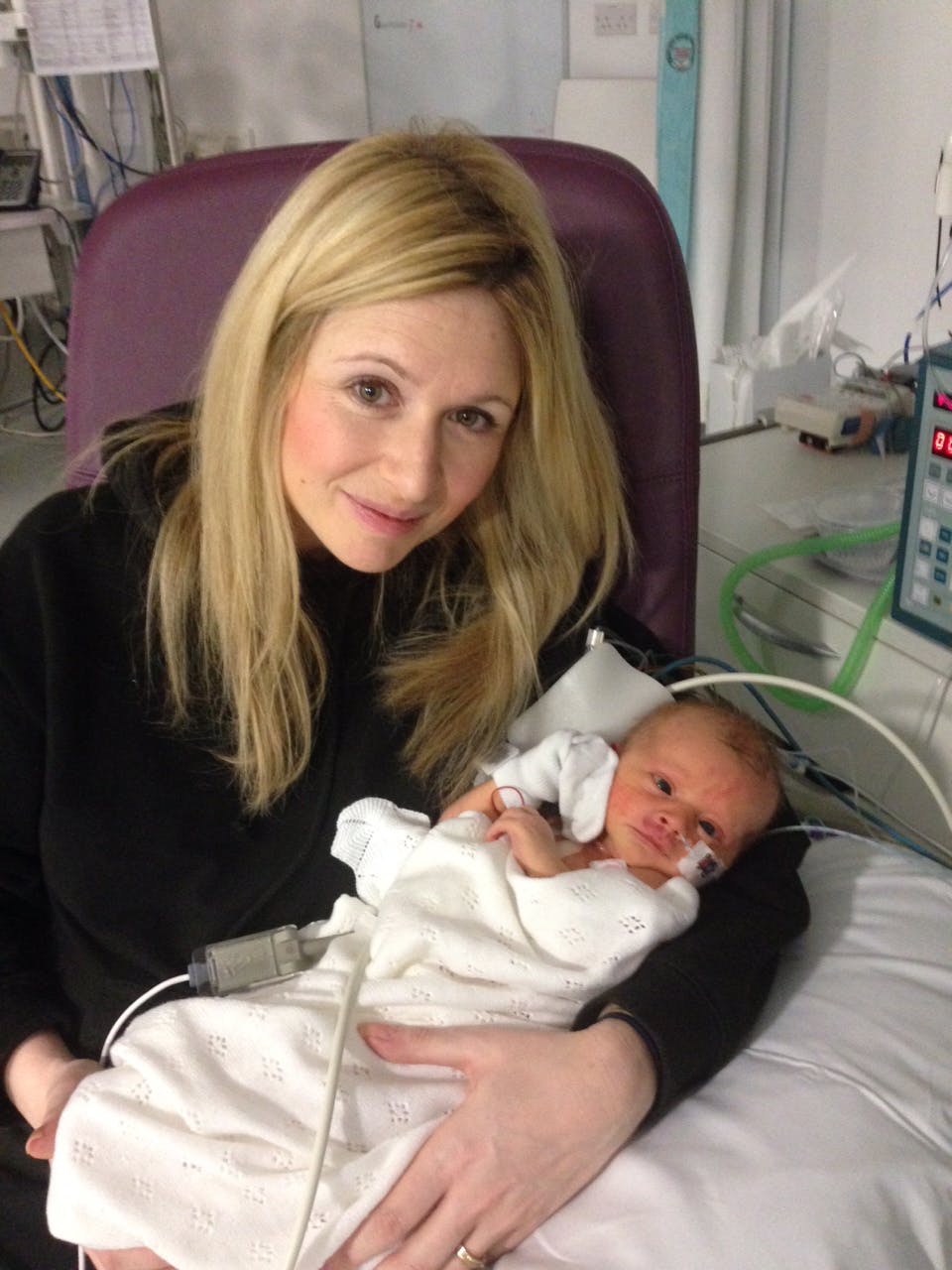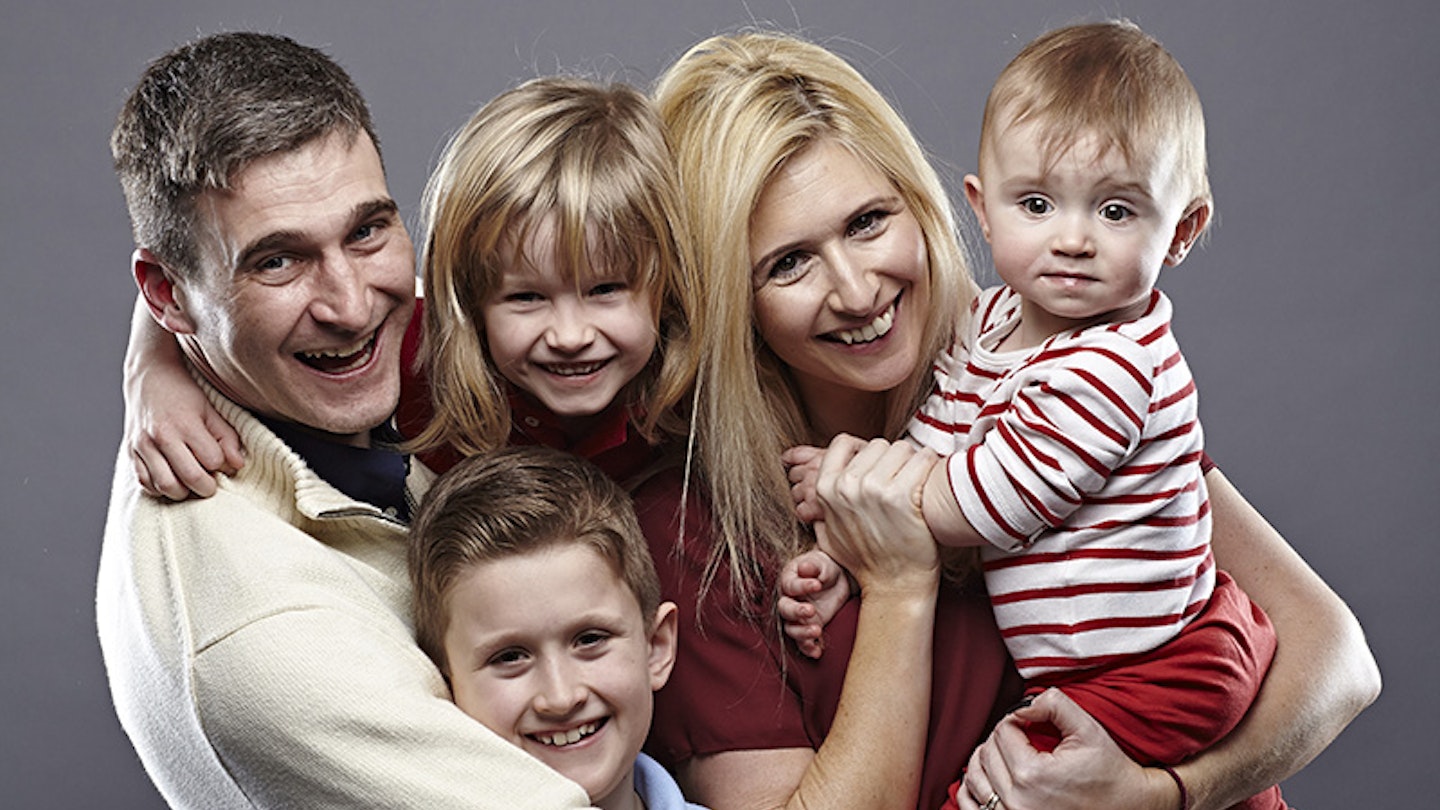When Lisa Parsley’s (34) baby was diagnosed with a rare genetic heart condition in the womb, she knew his only chance of survival would be a life or death dash from the delivery room to surgery. Here she shares her story:
As the woman doing the ultrasound took my hand and forced a smile, I knew immediately there was something very wrong with my baby.
I’d had no reason to worry as I went to the 20-week scan for my third child in October 2013. The previous scans had been fine and my other two children - Jack, seven and four-year-old Frankie - had been born healthy with no complications during pregnancy. I assumed this would be plain sailing too. How naïve and wrong I was.
Our baby almost certainly had a rare congenital condition - Transposition of the Great Arteries
A wave of nausea came over me as the sonographer huddled over the scans with a senior colleague. The room spun as she told me I should call my husband to come to the hospital immediately as they suspected our baby had a major heart defect. Jon was there within half an hour and they sat us down in the ‘quiet room’ and told us our baby almost certainly had a rare congenital condition - Transposition of the Great Arteries. In laymen’s terms, his heart wasn’t ‘plumbed’ properly and would have to be repaired within days of being born if he were to stand any chance of surviving.
I could barely breathe from trying to fight back the tears and I convinced myself there was no hope for the little life I was carrying.
Still in a haze of disbelief, two days later we travelled to a major cardiac unit in London for a more detailed scan to confirm the condition. The one chink of hope came when the doctor said we had two major factors on our side: the condition had been picked up before birth and was ‘fixable’ providing he had a procedure to keep the oxygen supply going within hours of being born, followed by gruelling heart surgery within 10 days.
Over the coming weeks as the news began to sink in, we had no choice but to carry on as normal for the sake of our other two boys. They were so excited about the prospect of a new baby brother or sister but we decided to tell them the truth – that he or she had a poorly heart and the doctors were going to try and make it better. At the same time as putting a brave faced on for them, I was torturing myself with the thought that this was all my fault and I had done something to give my baby a heart defect.
My waters broke on February 22nd at 7pm. It had been a normal Saturday for us, shopping and watching the boys play football with friends in the street. But what was to come was anything but normal.
As the ambulance sped through London - sirens and lights flashing - I barely spoke to Jon. I was numb and just didn’t want to think about anything.
We made it to the hospital just in time for our little boy’s arrival. Although he was 8lb 3oz he was so blue and my blood ran cold thinking maybe we’d already lost him.
I wasn’t allowed to hold him and welcome him into the world before he was whisked away and attached to tubes and machines that would hopefully keep him alive until he was strong enough to have his surgery.
It was hell not being able to do what comes naturally to every mother and hug my baby
It was hell not being able to do what comes naturally to every mother and hug my baby. We nearly lost him twice in the days after he was born. But miraculously, he became stable enough to be transported to London’s Great Ormond Street Hospital to have the life-saving operation called the Arterial Switch (pioneered by legendary heart surgeon Sir Magdi Yacoub in the 70s) to correct his condition.
The operation took six hours although it felt like six years and Jon and I have never felt so helpless. Then the moment we’d been praying for came – we were told the operation was a success. It was only then, when he began to wake up that we felt we were really meeting our little boy. We gave him a special name - Rocco - after the patron saint of health and to reflect the rocky start he’d had in life.
Two days after the operation I was finally able to hold him for the first time – he no longer bright blue and looked just like any other baby. A few days after that I thought I’d burst when we were told he could go home and that we should treat him like any other baby.
Soon we’ll be celebrating Rocco’s second birthday, one we thought we’d never see. Looking at him now it’s hard to believe he fought so hard for his life when he was born. He’s certainly the boss where his elder brothers are concerned and knows how to get his own way.
We’ll be forever grateful to the BHF and its funding of incredible research that has made operations like the Arterial Switch possible – and given life to our little boy and countless other children.
Jon and I wanted to tell our story to raise awareness of the condition and our whole family are committed to fundraising for the BHF as a very small way of giving something back. But it will never be enough…
The BHF is the UK’s largest funder of cardiovascular research. Through the public’s generosity it will fund half a billion pounds of life-saving research over the next five years. www.bhf.org.uk
*Transposition of the Great Arteries is a rare potentially life threatening condition if corrective surgery isn’t performed soon after birth. It affects up to 200 babies born in the UK each year.
*Babies with the condition appear ‘blue’ when born because the major blood vessels leaving the heart are the wrong way round, so blood containing little oxygen is pumped around the body.
*BHF-funded advances mean the number of children dying from congenital heart disease has fallen by 80 per cent in the past three decades, while life for survivors like Rocco is better than ever.

